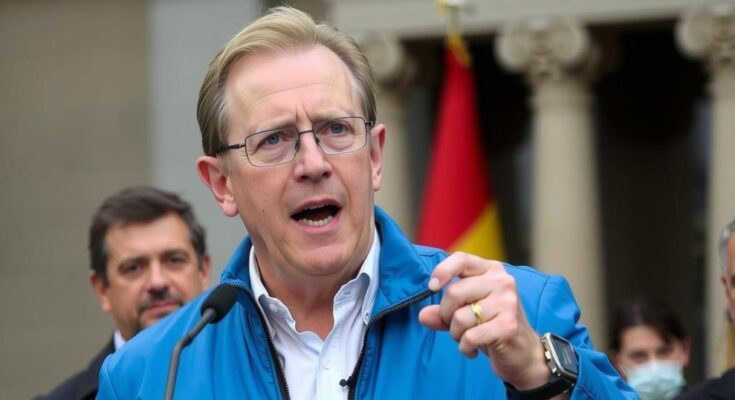Elon Musk publicly endorsed the far-right AfD in an op-ed, calling it Germany’s last hope, which sparked significant backlash from political figures and media. Critics accused Musk of interfering in German elections, raising concerns about foreign influence and press freedom. The AfD is polling at 20%, and Musk’s endorsement could legitimize their movement, benefitting his business interests while igniting debates about political integrity in journalism.
In a recent op-ed for the German newspaper Welt am Sonntag, US billionaire Elon Musk voiced his support for the far-right political party Alternative for Germany (AfD). He characterized the AfD as the country’s last hope amidst economic and cultural decline and advocated for their immigration and economic policies. Musk’s endorsement has incited significant backlash from German political leaders and media figures, leading to protests from within the newspaper’s editorial team and the resignation of an editor. Critics accused Musk of intruding into German electoral politics and likened his actions to those of autocrats seeking to manipulate democracy.
The AfD currently holds around 20% in opinion polls, making it a major contender in the upcoming elections. Musk’s op-ed not only reveals his personal political leanings but also raises questions about the influence of foreign figures on domestic politics. This event highlights the tensions over press freedom in Germany, where editorial content can unintentionally serve political interests. There is speculation regarding the motivations behind Musk’s commentary and its alignment with the agenda of Springer CEO Mathias Döpfner, a proponent of right-wing movements in Germany.
Furthermore, while Musk’s advocacy for the AfD may stem from his business interests—reflecting a desire for less regulation and lower taxes that would benefit his investments—his actions could also have broader implications for far-right normalization in German politics. The controversy underscores the significant potential for foreign influence in national elections, particularly in a political climate increasingly polarized between traditional parties and emerging populist movements.
The backdrop of this situation revolves around the increasing prominence of the AfD, a right-wing populist party that has garnered substantial support in Germany, capitalizing on concerns over immigration and economic stability. As they rise in popularity, their positions challenge the established political framework. Elon Musk’s foray into German electoral discourse raises issues of political interference and the role of international figures in shaping domestic politics. The publication of his politically charged op-ed ignited debates on journalistic integrity and the responsibilities of media outlets in reporting on political candidates and parties.
In conclusion, Elon Musk’s support for the AfD represents a complex intersection of foreign influence and domestic electoral politics in Germany. The resulting controversies highlight the delicate balance between press freedom and political integrity, as well as the potential consequences of foreign endorsement on local political dynamics. As the February elections approach, the implications of such endorsements will likely resonate beyond mere opinion pieces, influencing public perception and party legitimacy amidst a changing political landscape.
Original Source: www.dw.com




